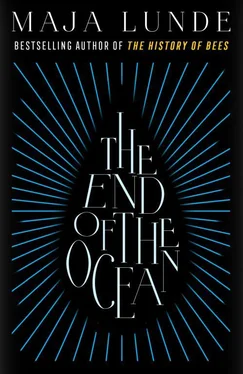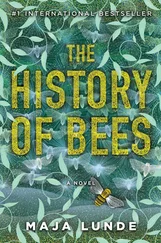“I’m going to the men’s shower.”
She nodded. I could see that she didn’t want to be alone, but she didn’t make a fuss about it.
“Remember to wash your hair,” I said. “Use one spurt to get it wet and then work it into a lather using both hands.”
I demonstrated with my fists in my own hair. “And then you have to use the next two spurts to rinse it. Get all the soap out.”
“I will.”
“Remember that you only have three spurts. First one. Afterwards, two.”
“And get all the soap out of my hair.”
*
The shower had no heating unit, but the water from the first spurt was lukewarm anyway. It never really got cold in this heat.
The spray hit me on the back of my head, hammering against my skull. I tried to absorb the sensation of each individual drop against my skin, taking pleasure in every single one.
Then the spurt of water abruptly came to an end. I turned towards the shower head. A little water was still trickling out, less and less, until there was no more.
One tenacious drop hung there. Finally it dripped off the shiny head and fell to the floor. Then nothing more.
There was a soap dispenser on the wall. I was almost a little moved by it, that someone had remembered that we needed soap, too.
I pressed it. Liquid soap in the palms of my hands. I rubbed my hands together, worked up a lather.
I washed myself thoroughly and for a long time. Hair, neck, hands, feet, crotch and behind.
The lather was slippery against my skin, removing all the grease. Removing the ash.
I had never been so dirty before, so sticky, so dry, so stinking of sweat. And smoke.
For a moment I didn’t think of anything else, not even of Anna, not of August, just about the soap, the water, about how it was like getting my body back, shedding a layer of skin.
I did as I had told Lou to do, using the last two spurts to rinse my body. The soapy lather lay in soft heaps on the floor by my feet.
I quickly dried myself off. The rough towel felt good against my skin and turned a light-brown color when I rubbed my arms with it, massaging away dead skin cells.
Then I took my clothes out of the bag. They were just as dirty, just as smelly. I would have to ask if we could wash them, too.
Beneath the clothes were Anna’s and August’s passports. I picked up Anna’s and held it in my hand, as I had done so many times in the past weeks. The cover was slippery beneath my fingers. I opened it.
Anna wasn’t smiling in the photograph. It was black and white, making it difficult to recognize her. You couldn’t see that her hair had a golden tint. Or that there were green flecks in her eyes. Or that she had one of those quick strides, as if she were a bit busy and cheerful, even when she was feeling the opposite.
But it was the only photograph I had.
I lifted the passport to my nose, sniffed it. It still smelled of smoke.
I was clean now. Had washed the fire off me.
I had removed the memory of her when I washed the smell of smoke off me.
Abruptly I hugged the T-shirt against me, inhaling the acrid smell of smoke. She was still there, she and August. They were still here.
Itake a shower in the cubicle between the saloon and the forepeak cabin, listen to the pump running, taking care not to splash too much on the bulkhead, directing all the water into the tub underneath me, because there is no drain in the room. My body feels quick and agile as I wash myself, primed, as if I were twenty years old again. Afterwards I fill up the tank with water from the faucet on the dock, as it must be completely full. I have to be able to stay away from land until they stop searching. To be on the safe side, I also fill up two 20-liter jugs and stow them in the afterpeak—enough water to be out at sea for weeks while they are searching, if they search, if they realize that I am responsible and they will perhaps do so, people in the village have seen me, know Blue , know my story. They can put two and two together.
During the final hour before the sun goes down and people leave the quay, I just wait, sitting on deck having a cup of coffee, forcing myself to eat calmly, a few slices of bread with peppered mackerel. The food tastes better than anything I’ve eaten in a long time; I chew slowly, looking at my father’s old house. He lived down here by the harbor once upon a time, but now the house is empty. When he died, I sold it for a song to someone who wanted to use it as a vacation cottage. Apparently they aren’t there much. The windows are dark empty squares.
The house is just as silent as the harbor, because now everyone has left and I am alone.
I jump ashore, walk towards the cargo ship, a heavy vessel of iron with patches of rust along the seam welds. I hop lightly from the quay down onto deck, landing almost without a sound.
The door to the wheel house is locked, but otherwise all the doors are open; they haven’t even thought about locking up, can’t imagine that something could happen here, deep in the bowels of the fjord. Bowels, something shameful, a dark inside , where nobody really cares, where everything that has meant something to us has slowly been developed, exploited, where the rivers, waterfalls and grazing lands have disappeared. Nobody cares. Neither do they care about Blåfonna being destroyed. They don’t want to hear, don’t want to see, they are like him, all of them, his entire generation, my generation, they just want better wines, larger vacation cottages, faster internet connections.
I go down into the cargo hold. It’s cold, a freezer is humming, I find a switch, blink at the bright light, at the frost vapor from my own mouth, at the containers—they haven’t been properly secured, have been left out on the floor. I walk over to the closest, stroke the hard plastic. They must be expensive, cast in one piece, shiny, royal blue, hard plastic. These will not decompose for 450 years, maybe 500 years, maybe even longer, longer than a plastic bottle, longer than a disposable diaper, a pair of sunglasses, a Barbie doll, a fleece-lined jacket. Much, much longer than any human being.
I open the top one, have to tug at the lid, it has already frozen shut and inside it is the ice, vacuum packed in an extra layer of plastic, protected by a thick lining of white insulation material; for a moment I run my hand across it, feeling the cold beneath my fingers, then I put the lid back in place.
*
The first one is surprisingly light. I carry it up the ladder, fling it towards the iron deck, feeling the reverberation under my feet when it lands. I don’t worry about trying to be quiet, take the lid off all the way, and yank the blocks of ice out of the plastic, my fingers tingling. I pull out a pair of gloves I remembered to bring along and then I hurl it over the railing, down into the fjord.
The second one also goes overboard easily, the third, the fourth, but then it becomes too difficult, I can’t manage any more. There are far too many containers.
I look at the crane on the quay—maybe I can use it, but there is no key in it, so I go down into the cargo hold again, stand facing the containers, looking at them. I can’t manage all of them. I step closer. My gaze slides across the broadside and I notice a joint in the woodwork aport—no, an opening, there is a hatch. Further up on the bulkhead I spot a button. I press it and the hatch responds immediately, sliding open with a loud creak.
Now I can lift the ice directly out—the fifth, the sixth, the seventh—soon I lose count. I fling the containers onto the floor, they’re not going into the water, although they will perhaps end up there anyway, to join the mountains and islands of plastic in the ocean and slowly decompose into microplastic, disappear into the digestive system of a fish, be served up on a plate to be eaten by a human being, who eats his or her own garbage, the way we all eat our own garbage every single day.
Читать дальше










